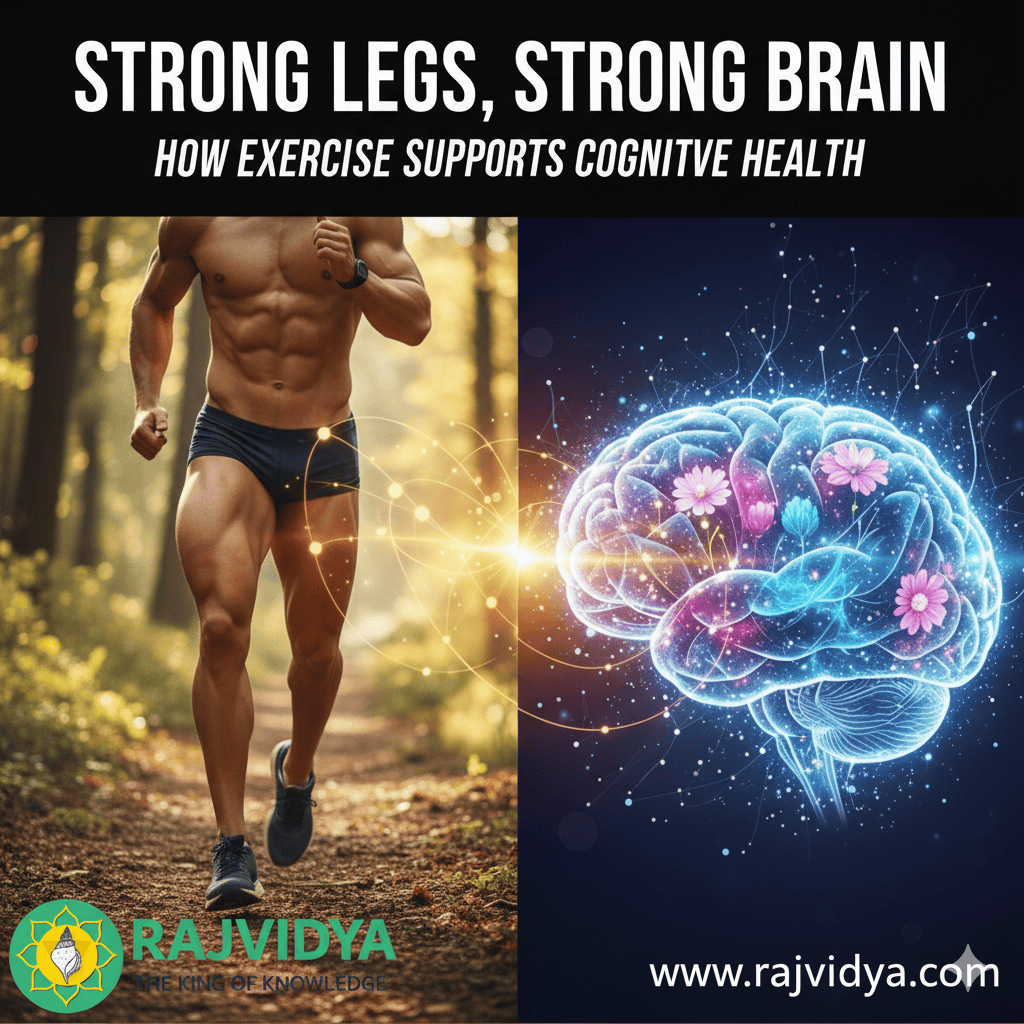HPC -9 : Strong Legs, Strong Brain: How Exercise Supports Cognitive Health
- Health Penal Code HPC-9
- Category Exercise Law
RAJVIDYA uploaded new photos

Health Penal Code - 9
“The more powerful your legs, the better your brain.”
Modern science and Ayurveda both agree on this timeless truth. Building physical strength, especially in the legs, doesn’t just improve mobility and stamina—it also protects brain health, sharpens memory, and reduces the risk of age-related cognitive decline.
Health Penal Code - 9
Modern science is uncovering fascinating insights into the connection between physical strength and brain health. A well-known study that followed 300 female twins around the age of 55 revealed a striking link: women with stronger leg muscles in midlife had better brain function even a decade later. The researchers deliberately used a twin design to control for genetics and early environment, allowing them to isolate the role of muscle fitness.
The results were profound:
-
Leg strength was the strongest predictor of healthy cognitive aging, even when factors like smoking, diet, diabetes, and socioeconomic status were accounted for.
-
MRI scans 12 years later showed participants with greater leg power had larger gray matter volume, smaller ventricles, and healthier brain structures—signs of preserved brain health.
-
As Dr. Claire Steves of King’s College London explained: “When it came to cognitive ageing, leg strength was the strongest factor that had an impact in our study.”
Other experts such as Dr. Doug Brown of the Alzheimer’s Society and Dr. Simon Ridley of Alzheimer’s Research UK emphasized that these findings add to growing evidence showing physical activity benefits the brain as much as the body.
How Ayurveda Sees It
Ayurveda, thousands of years before modern MRI technology, explained the leg–brain connection through concepts of Bala (strength), Vāta balance, and Majjā Dhātu (nervous tissue including brain and spinal cord).
-
Vyāyāma (Exercise) as Root of Strength:
“Balasya mūlaṃ vyāyāmaḥ” (Charaka Saṃhitā, Sūtrasthāna 7.32) – Exercise is the foundation of strength. This strength is not limited to muscles, but extends to mental resilience, immunity, and clarity of intellect. -
Effects on Doṣa and Dhātu:
Proper exercise ensures smooth circulation of Apāna Vāyu (downward-moving energy) in the legs, which stabilizes Prāṇa Vāyu (the vital energy governing the brain, memory, and senses). This harmonious balance nourishes Majjā Dhātu, supporting Smṛti (memory) and Medhā (intellect). -
Detoxification and Agni:
Suśruta explains that exercise stimulates Agni (digestive fire), prevents accumulation of Āma (toxins), and maintains clarity of Indriyas (senses)—all crucial to protecting cognitive functions. -
Ayurvedic Daily Regimen:
Aṣṭāṅga Hṛdaya recommends Vyayāma (exercise) as part of Dinacharya (daily routine), noting benefits like lightness, stamina, efficiency in work, stability, and balance of doṣas. These factors parallel the modern understanding of how exercise protects against dementia, brain shrinkage, and mental decline.
Integrating Both Perspectives
From a combined lens, leg strength is not just a matter of mobility or aesthetics—it’s a biomarker of overall vitality. Strong legs mean:
-
Better circulation, sending oxygen and nutrients to the brain
-
Improved metabolism, reducing risk of diabetes and vascular damage that harm brain tissue
-
Balanced Vāta, ensuring mental stability, reduced anxiety, and steady cognition
-
Healthy Majjā Dhātu, nourishing the nervous system and supporting long-term memory
Thus, both neuroscience and Ayurveda agree: the stronger the legs, the sharper and more resilient the brain.
Diseases Caused by Not Doing Exercise
From both modern and Ayurvedic perspectives, avoiding regular exercise can lead to:
-
Cognitive decline and memory loss (dementia, Alzheimer’s risk)
-
Poor circulation leading to reduced brain oxygenation
-
Vāta imbalance causing anxiety, insomnia, and forgetfulness
-
Obesity, diabetes, and metabolic disorders—indirect causes of brain degeneration
-
Loss of muscle mass and bone density, leading to frailty and reduced mental activity
Ayurveda warns that a sedentary lifestyle (Avyayama) causes Āma accumulation (toxins), weakens Agni (digestive fire), disturbs Vāta Doṣa, and accelerates both physical and mental aging.
Remedy on Strong Legs, Strong Brain: How Exercise Supports Cognitive Health
Practical steps to protect both legs and brain health:
Exercise
-
Squats, lunges, and deadlifts (modern compound exercises)
-
Surya Namaskar and leg-focused Yogasanas: Vrikshasana (Tree Pose), Trikonasana, Virabhadrasana (Warrior Pose)
-
Daily brisk walking or cycling
Ayurvedic Practices
-
Dinacharya: Morning stretching and regular movement
-
Herbal Medhya Rasayana: Brahmi, Shankhpushpi, Ashwagandha for cognition and stamina
-
Pathya Āhāra (Wholesome diet): Ghee, nuts, green vegetables, whole grains for nourishing Majjā Dhātu (nervous system)
-
Lifestyle: Balanced work-rest, meditation, and pranayama to stabilize Prāṇa and Apāna Vāyu
By strengthening the body, especially the legs, we enhance circulation, balance doṣas, protect the nervous system, and preserve memory and intellect into old age.
Reference books of HPC - 9
-
Charaka Saṃhitā – Sūtrasthāna 7.32
-
Suśruta Saṃhitā – Sūtrasthāna 15.28
-
Aṣṭāṅga Hṛdaya – Sūtrasthāna 2.10
-
Study by Dr. Claire Steves, King’s College London (2015) – Twin leg strength and cognitive aging research
-
Alzheimer’s Society & Alzheimer’s Research UK commentary on exercise and dementia prevention
Give your Feedback and Reviews
Rating Breakdown
No feedback available.